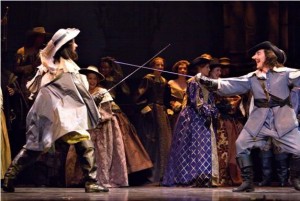
‘Cyrano’ could prove good box office for FGO
One of the more interesting things I discovered, silly as this sounds, when I first saw the Jean-Paul Rappeneau film of Edmond Rostand’s Cyrano de Bergerac (with Gerard Depardieu in the title role) more than 20 years ago, was how good a play it was.
Having never seen it in French, only several bad versions of it in English, I was unprepared but pleasantly surprised at how strong a work of theater Cyrano is, and how beautiful most of the language was (at least to me, only having studied French in high school and college). Indeed, the historical Cyrano de Bergerac (1619-1655) was a substantial, brilliant writer, and a pioneer of what we would call sci-fi today. But he would be known today only to students of French literature were it not for Rostand, who reintroduced him to the educated public in 1897.
The Italian composer Franco Alfano, best-known for finishing Puccini’s Turandot, wrote an opera in 1936 based on Rostand’s play that the Metropolitan Opera revived back in 2005 for Placido Domingo, and pieces of him singing the part can be seen on YouTube (here, for instance). The once-eminent conductor and educator Walter Damrosch wrote a version that the Met premiered in 1913, but that didn’t hold the stage.
On Saturday night, Florida Grand Opera brings us American composer David DiChiera’s Cyrano, premiered in 2007 at the Michigan Opera Theater to a libretto in French by the fine French opera director Bernard Uzan, who directed Madama Butterfly for FGO a couple seasons ago. It stars the original creators of the chief roles – the Romanian baritone Marian Pop as Cyrano and the American soprano Leah Partridge as Roxane – and runs through May 7 at the Ziff Ballet Opera House. Here again, YouTube provides a library of performances from this opera, such as this very nice quintet.
Cyrano has always seemed to me to be a perfect subject for a composer like Massenet, who for all I know might have considered a treatment of it. Years ago, I saw his Cherubin at the Santa Fe Opera, and I found it charming, especially the pastiche serenade music, which is the kind of thing Massenet did really well. Film was in its infancy when he died in 1912, but had he lived longer he might have found film to be a good match for his talents in his final years.
From the excerpts I’ve heard, the ghosts of Massenet and even Gounod hang heavy over DiChiera’s score, but I haven’t seen or heard the whole thing, so I don’t know whether it stays that way throughout. Press coverage and logic, though, dictate that it probably does. Writing an opera in a throwback style takes as much skill as writing one in a more current idiom, and you could argue that the influence of film music makes a wide variety of styles “current” anyway, so it doesn’t matter as much to the critical element as it used to.
What matters to the opera-going public is whether or not there’s a compelling drama or comedy on stage, great singing, and memorable music overall to carry the evening. If the music of Cyrano is honest and sincerely crafted, even in a style that’s long been out of fashion, and it wins over its audience, then you’ve got a successful outing at the theater. Rostand’s story has proven to be good box office (as indeed did off-Broadway’s The Fantasticks, which is based on another Rostand play), and DiChiera’s retro music, from the excerpts I’ve heard, sounds like an engaging fit for the libretto.
All of which makes it likely that the poet and swashbuckler’s posthumous fame will continue, and in this case, remind us of the durability of an artistic style fashioned in the days when grand opera was at its ripest height.
Cyrano, which includes the debut of a new aria, premieres at 7 p.m. Saturday at the Ziff Ballet Opera House at the Adrienne Arsht Center, Miami. Additional performances are set for 8 p.m. April 26, 29, May 4 and May 7, with a matinee at 2 p.m. May 1. Call 800-741-1010 or visit www.fgo.org.
Recent Content
-
Artsarticle ·
-
Artsarticle ·
-
Artsarticle ·

